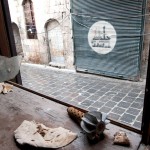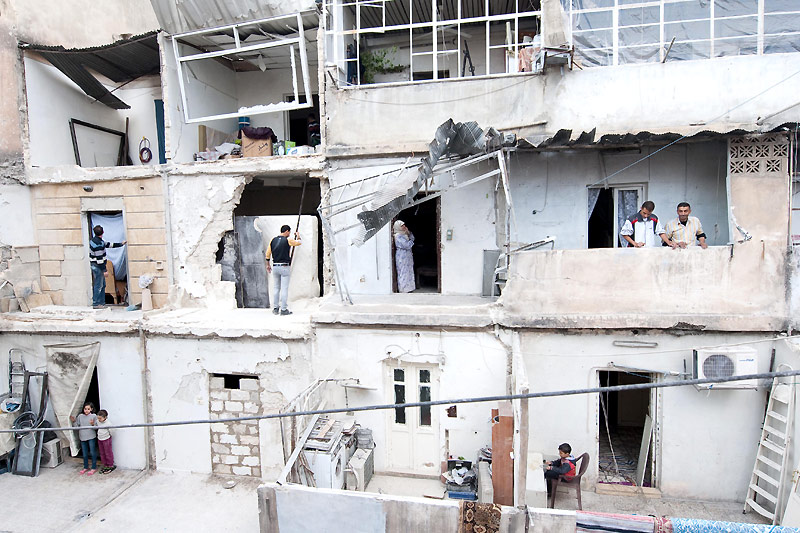In March and April, the delivery of water, food and other aid items to people affected by the conflict continued to be a major challenge. Amid ongoing hostilities, the ICRC assisted over 900,000 people across the country, working closely with the Syrian Arab Red Crescent (SARC).
“The SARC’s presence in both Government and opposition-controlled areas, its proximity to affected populations, the dedication of its staff and volunteers and their deep knowledge of the terrain allow the ICRC to deliver aid even in the most challenging environments,” said Daphnée Maret, deputy head of the ICRC delegation who coordinates assistance programmes in Syria.
Food and other aid items remain central to today’s ICRC emergency response, but close coordination with local actors like the SARC is more than ever needed to operate and deliver in areas where the organization does not yet have a permanent presence.
“How we coordinate with SARC headquarters and its local branches determines to a great extent our ability to assist people,” explained Ms Maret. “By working closely with SARC at a local level, we can better understand the landscape and the needs.”
A typical assistance operation requires an assessment of the needs, negotiating the necessary authorizations, an up-to-date evaluation of the security situation and, lastly, the deployment of multi-truck convoys that need to pass through numerous checkpoints to reach their destinations.
“Close cooperation means well-coordinated and effective assistance to people directly affected by the conflict,” said Firas al Nakeeb, the SARC’s Damascus-based field coordinator. “The ICRC supports us by virtue of its long experience working in armed conflicts worldwide and we in turn provide it with our understanding of local needs and dynamics.”
Facts and Figures – March/April 2014
Syria is the ICRC’s largest operation in terms of financial resources, and is present in Damascus, Aleppo and Tartous. Over 240 staff work in the country, distributing food and other essentials, restoring water supplies and re-establishing contact between people separated by the conflict.
Emergency aid
In March and April, the ICRC supplied food to over 900,000 people in ten governorates, including Damascus, Rural Damascus, Homs and Deir Ez Zor. The vast majority of beneficiaries were internally displaced persons (IDPs). Nearly 12,000 people living in shelters in Homs and Damascus received daily meals through collective kitchens supported by the SARC and supplied by the ICRC. Over 180,000 other people displaced by the fighting received essential household items such as hygiene kits, blankets, mattresses and kitchen sets.
Water and sanitation
The ICRC worked closely with the SARC and local water boards to provide:

Old city, Aleppo, A man leavs his home with a few belongings in search of a safer place. / CC BY-NC-ND / ICRC / H. Hvanesian
- Equipment such as pumps and generators to water treatment plants in Garur, Kasmaya, Akhtarin and Gurur serving the population of Aleppo Governorate;
- Equipment such as pumps and generators to water stations in Bab el Neirab, Sulaiman Al Halabi (both serving people in Aleppo governorate) and in Ein al Tanour, Homs governorate;
- Equipment for the Salamyia sewage treatment plant in Hama governorate;
- Water treatment materials to water treatment plants in Aleppo and Hama governorates;
- Repairs to a major pipeline in Dara’a, ensuring that 75,000 residents continued to receive clean water;
- Dozens of tanker trucks that brought water to more than 100,000 people in Homs, Rural Damascus and Deir Ez Zor;
- Upgrades to 54 IDP centres, ensuring clean water, proper sanitation and decent housing for 15,500 people in Damascus, Rural Damascus, Dara’a, Homs, Raqqa, Aleppo and Latakkia;
- Coverage of the main garbage dumpster in Idleb city, providing better sanitary living conditions for 100,000 people;
- A ‘Water in Emergency’ training workshop, held in Banias, Tartous governorate, that brought together over 50 SARC water and sanitation volunteers working in 14 governorates.
Health
The ICRC worked closely with the SARC to provide:

Old city, Aleppo, Part of a mortar bomb lies in the remains of a shop window, its deadly menace contrasting oddly with pieces of life-giving bread. / CC BY-NC-ND / ICRC / H. Hvanesian
- Five health facilities in government and opposition-controlled areas with surgical instruments, medicine and medical consumables;
- Material and financial support to seven SARC mobile health units and one polyclinic which together have the capacity to provide health services to over 7,000 people every month;
- A training workshop for SARC mobile health unit managers to improve their response capacity in emergencies.
Protection
- The ICRC provided 14 people without valid identification with ICRC temporary travel documents, issued in coordination with the Syrian authorities and the UNHCR, enabling them to resettle outside Syria.
- The ICRC delegation in Damascus also received 369 tracing requests from people seeking to locate their relatives and facilitated the reunification of two children aged 10 and 9 with their mother in Cairo, Egypt.
- The ICRC collected 15 Red Cross messages (brief messages containing family news) and 120 salamats (oral messages to family members), mainly from Syrians abroad.


